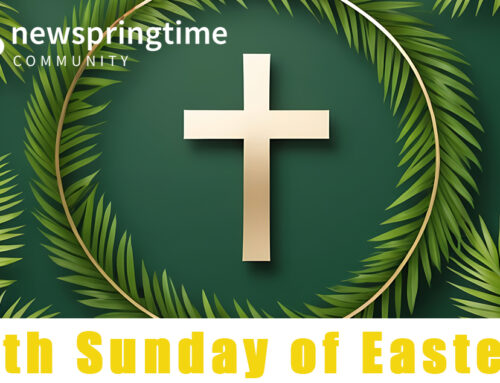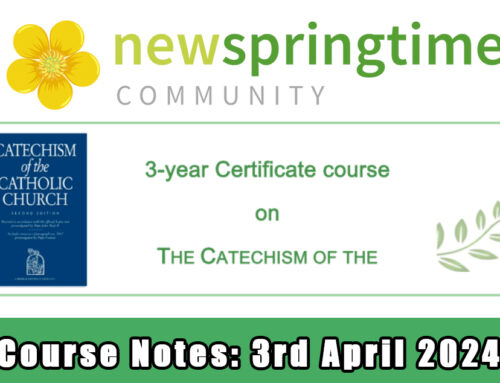The Catechism of the Catholic Church – 20th March 2024
To download The Catechism of the Catholic Church course notes for 20th March 2024, please click here
Catechism Commentary 22
We know from St Paul that the Church is “built upon the foundation of the apostles and prophets, Christ Jesus being the cornerstone” (Eph 2:20). Our Church is apostolic because it holds and teaches the faith, as taught to the twelve apostles by Christ himself. We refer to the apostles as “hand-picked successors” since Jesus chose them to continue his mission after his death and Resurrection. He entrusted the leadership of his Church to the apostle Peter saying, “You are Peter, and upon this rock I will build my church, and the gates of the netherworld shall not prevail against it” (Matthew 16:18). Thus, Peter became the first bishop and pope. Through these actions, Jesus wasn’t setting up his friends in positions of power, influence, and honor. Instead, he was calling them to a life of service as missionaries as members of his Church. All the bishops and popes who have followed, up to the present day, share in that mission.
Pope Francis has said, “without Jesus there is no church.” The guarantee that the church is teaching and sharing the authentic Jesus, he said, comes through its fidelity to the teaching and preaching of the apostles. “Through the centuries,” he explained, “the church preserves this precious treasure, which is the sacred Scriptures, the sacraments and the ministry of its pastors so that we can be faithful to Christ and participate in his life.”
In his capacity as the official teacher of the Church, Catholics believe that the Pope has the gift of infallibility, i.e., the inability to be wrong. In the Roman Catholic Church, our belief in Papal inerrancy refers to the times when the Pope,
- Intends to teach
- By virtue of his supreme authority
- On a matter of faith and morals
- To the whole Church.
He is preserved by the Holy Spirit from error when he speaks ex cathedra, i.e., from the chair of Peter. His teaching is therefore called “infallible” in those instances such as defining the doctrine of the Immaculate Conception and the Assumption of Mary. Teaching of this level of authority are termed “irreformable,” i.e., it can’t be changed. That is a main source of unity in the Church. As St Ignatius of Antioch who died around 108 AD wrote, “Do nothing without the bishop. Guard your bodies as temples of God. Love unity. Flee from divisions. Become imitators of Jesus Christ. Just as he is of his Father.”
Our Lady gave a prophetic message to Sr Agnes Sasagawa in Akita, Japan in 1973. In part of it she said that in the future there could be a great catastrophe if the people of the world do not repent. She also said, “The work of the devil will infiltrate even into the Church in such a way that one will see cardinals opposing cardinals, bishops against bishops.” Surely, that has already begun to happen. Extreme liberals, e.g., Bishop Georg Bätzing in Germany, and conservatives, e.g., bishop Joseph Strickland in the United States, including some Cardinals, e.g., Raymond Burke, and other bishops and priests have attacked Pope Francis and reject not only many of his teachings but also those of the Second Vatican Council. Archbishop Vigano, a former papal nuncio to the USA, has suggested in a video entitled, “Is the Pope Catholic?” that Pope Francis is a “false prophet” and an “apostate pope.” When he visited Slovakia, Pope Francis said to some Jesuits, “There is a large Catholic television channel (EWTN) that has no hesitation in continually speaking ill of the pope.” He said: “I personally deserve attacks and insults because I am a sinner, but the church does not deserve them. They are the work of the devil. I have also said this to some of them.” Speaking about the dissidents Cardinal Wuerl of Washington said, “the common thread that runs through all of these dissenters is that they disagree with the Pope because he does not agree with their positions.” As a result, they are not only disrespectful to him, they also cause the scandal of division, and create, as Pope Francis has warned, the possibility of schism in the Church. In doing this they betray the deference due to the successor of Peter.
The whole Church is apostolic in so far as it remains in communion of faith and life by being united in mind and heart with the successor of Peter, who providence has chosen for us together with our bishops, as long as the latter remain in union with the Pope. As Catholics who share in the mandate given to the apostles, as was noted in last week’s commentary, we have to spread the apostolic teaching by means of evangelisation. That means that we need to know and experience the power of the basic gospel message as well as being able to catechize people who don’t know much about the Christian faith. One excellent way of preparing to do this is by studying the CCC which informs us in a very reliable way about what exactly the official, orthodox teaching of the Church really is.





